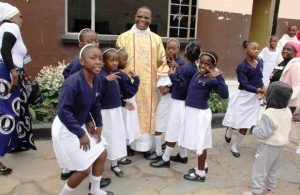“I really believe that a missionary priest is a person called by God to meet the overwhelming gratuitous love of God for humanity.” A Comboni Father Placide Majambo Lutumba Petir from Congo tell us his story.
I grew up in a fairly quiet and peaceful atmosphere, but also very Christian. My mother sang in the church choir and every time she went to church for mass or singing practice, she did everything for me to be with her. That is how I became an altar server in my home parish. I admired Fr Egide Bulamilungu, the priest who baptised me.
I was twelve when my dad and Fr Egide decided to send me to the minor seminary of the diocese of Idiofa. There I learned and was accustomed to certain activities such as reading of the Bible, manual work, football, etc. Above all, I liked being responsible for electricity in the seminary. After completing the six years in 2001, I asked to join the Comboni missionaries where another of my friends had already joined. However, my father did not support my idea because I am the first born in the family. Children ahead of me are my stepbrother and sister. It took him some time to be fully convinced of my vocation.
That is how in 2002, he sent me to register as a student candidate for first year medicine at the University of Kinshasa where two of my classmates in the seminary were already studying. However, I disobeyed him as I was convinced to become a missionary. To save time until I formally declared my disagreement with him, I chose to use the university fees to start a small business in Ngaba roundabout in Kinshasa. My business was selling cigarettes: one of the most attractive products of the market. As soon as I started, I was nicknamed Mopao by the street boys of the area due to the rapid improvement of the business. In addition, unlike other sellers, Mopao was a bit generous with everyone.
It was during this experience that I met Mamie Nyembo, who used to take care of those street boys and was the responsible for vocations in my home parish in Pighini. She helped me to reconnect with the Comboni Missionaries and became as my saviour in search of my vocation. Through her, I met Fr Jerome Anakese, director of the vocations in Kinshasa. After several meetings with Fr Anakese, in 2003 I joined the eight people chosen to start the pre-postulancy in Kimbanseke (Kinshasa).
I first thought of becoming a Comboni brother because of my ability to do practical things. After discussing with Fr Jerome to clarify my vocational motivations, I decided to apply for priesthood. From 2004 to 2007 I did my philosophical studies in Kisangani. Then I went to the Noviciate in Cotonou (Benin). I had four companions, but I was the only one among the eight who joined pre-postulancy in Kinshasa.
In the second year of noviciate, I was sent to our parish of Tabligbo (Togo) for my experience of six months. I felt over the moon when my family friend travelled all the way from Togo to attend the celebration of our first profession in Cotonou on May 16, 2009. In July 2009, I reached the scholasticate of Nairobi where I was to begin a new experience with the English language before studying theology. After successfully completing my studies of English, I joint Hekima College, the Jesuits school of Theology.
As a student in Nairobi, I had the chance to visit South Sudan twice and the lives of people there affected me. On July 12, 2014, I took my final vows in St Josephine Bakhita parish (Mapuordit in South Sudan) and was ordained a deacon the next day. It was such a great celebration for the people, because it was the first time people attended an ordination. The entire diocese of Rumbek counts only five local priests.
Education at all levels is our priority because youth in the Church represent nearly 70% of the faithful. Therefore, our first task is to have them baptised and committed to serve the church and the new nation. That sums up my experience as a parish priest every day. The spiritual desire of the people is to meet a God-providence who is the light for them in the darkness of their daily lives. I am happy that I can intercede for them through my personal prayer and I also help them to solve some of their everyday challenges.
Actually, these years I have been very bad for them. People really suffered and endured atrocities and violence. Not only has there been loss of lives and properties in the conflict, but also the social structures, the traditional and cultural relations that existed among our communities have been shattered.
I was personally a victim of these tribal clashes when some men attacked our car and I have been shot and wounded. It was not an easy experience, but as St Paul says we keep walking in/with the Spirit (Gal 5:13-18). This is our life in South Sudan: a place where Jesus the Good Shepherd must reach. I really believe that a missionary priest is a person called by God to meet the overwhelming gratuitous love of God for humanity.






